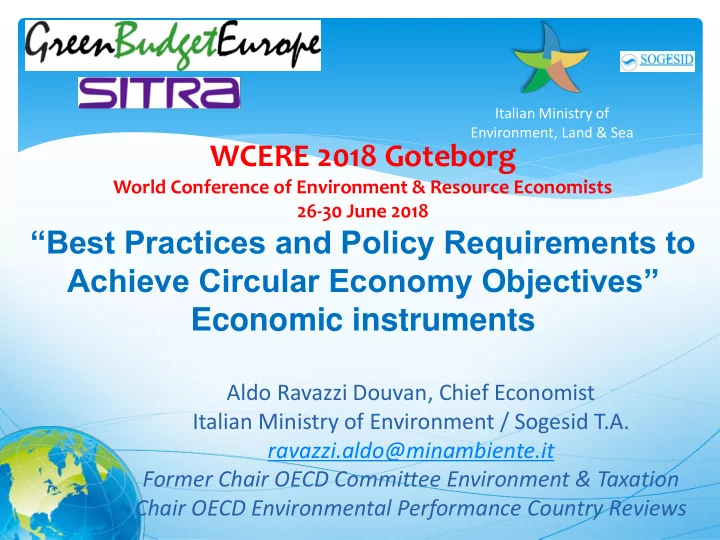

Italian Ministry of Environment, Land & Sea WCERE 2018 Goteborg World Conference of Environment & Resource Economists 26-30 June 2018 “Best Practices and Policy Requirements to Achieve Circular Economy Objectives” Economic instruments Aldo Ravazzi Douvan, Chief Economist Italian Ministry of Environment / Sogesid T.A. ravazzi.aldo@minambiente.it Former Chair OECD Committee Environment & Taxation Chair OECD Environmental Performance Country Reviews
From Olocene to Anthropocene?
10 Planet Ecosystems to be kept under control: 1. Climate change 2. Biodiversity loss 3. Nitrogen cycle 4. Phosphorus cycle 5. Stratospheric ozone depletion 6. Ocean acidification 7. Global freshwater use 8. Land system change 9. Atmospheric aerosol loading 10.Chemical pollution BE BASED ON AVAILABLE SCIENCE: THE PLANETARY BOUNDARIES
9 Planet Boundaries to be kept under control : 1. Climate Change 2. Biosphere integrity ( Biodiversity ) 3. Stratospheric ozone 4. Atmospheric aerosol 5. Ocean acidification 6. Biogeochemical flows ( P, N ) 7. Land-system change 8. Freshwater use 9. Novel entities ... Source: Rockstroem et al. (2009) and Steffen et al. Planetary Boundaries: Guiding human development on a changing planet, 4 Science, 16.1.2015;
Club of Rome (1968): the MIT study 1972 - Oct. 2018: 50 years celebration in Rome
Source: Ellen Mc Arthur Foun Dation (2012)
CIRCULAR ECONOMY: DECOUPLING DIREZIONE GENERALE PER LO SVILUPPO SOSTENIBILE, PER IL DANNO AMBIENTALE E PER I RAPPORTI CON L'UNIONE EUROPEA E GLI ORGANISMI INTERNAZIONALI
CIRCULAR ECONOMY: POLICY OPTIONS CATEGORY OF INSTRUMENTS ✓ REGULATORY (COMMAND & CONTROL, PERFORMANCE E TECHNOLOGY STANDARDS) ✓ VOLUNTARY (MoU, COVENANTS, /DEALS, LABELS, REPORTING, …) ✓ ECONOMIC (TAXES, TARIFFS/CHARGES/FEES, MARKET CREATION, SUBSIDIES EHS_EFS, SANCTIONS) • EFFICIENCY ASSESSMENT ✓ ENVIRONMENTAL EFFECTIVENESS (CONSISTENCY ALONG THE WHOLE LIFE CYCLE) ✓ ECONOMIC EFFICIENCY ✓ INCENTIVE TO INNOVATION ✓ ADMINISTRATIVE COSTS ✓ DISTRIBUTIONAL IMPACT ✓ COMPETITIVENESS IMPACT DIREZIONE GENERALE PER LO SVILUPPO SOSTENIBILE, PER IL DANNO AMBIENTALE E PER I RAPPORTI CON L'UNIONE EUROPEA E GLI ORGANISMI INTERNAZIONALI
European reflection Examples of economic instruments and other measures to provide incentives for the application of the EU waste hierarchy 1. Charges and restrictions for the landfilling and incineration of waste 2. ‘Pay -as-you- throw’ schemes 3. Fiscal incentives for donation of products, in particular food 4. Extended producer responsibility schemes 5. Deposit-refund schemes 6. Investments in waste management infrastructure 7. Sustainable[/Green] public procurement [GPP] 8. Phasing out subsidies [EHSs, BHSs, FFSs, RECEHSs] 9. Fiscal measures to promote the uptake of recyclable products & materials [tax/fee on caves, quarries, mines, gravel/sand from riverbeds, ...] 10. Support to research and innovation [Eco-Innovation]
FRAMEWORK CONDITIONS i. measuring the environmental impact of human activities and internalizing environmental costs; ii. considering natural capital next to traditional invested capital, human capital and social capital in public and private decision-making; iii. restoring fair market conditions through ecological fiscal reform, carbon pricing and phasing out environmentally harmful subsidies; iv. supporting international cooperation and aid development which respects planetary boundaries; v. promoting sustainable finance.
SOME KEY QUESTIONS a) Best practices: blessed and welcome; best practices mythology – 10% showing the way forward – how do we bring with us the remaining 90%? b) Innovation, deep innovation, disruptive innovation, green innovation, eco-innovation – how do we guarantee that innovation arrives in time? c) Firms maximise Resource Efficiency every day, they practice Circular economy whenever it is convenient: they reduce costs, they maximize profits: why is the cumulative behaviour at economy level insufficient, why do we need public intervention?
Recommend
More recommend